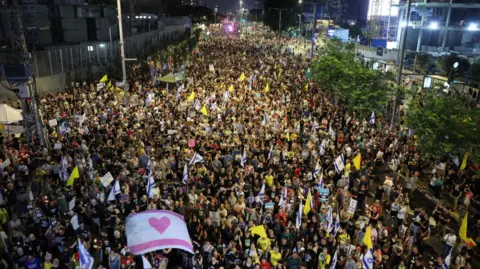The ongoing conflict in Gaza has triggered mounting protests across Israel, as public dissent against the government’s military strategy intensifies. Thousands of citizens have taken to the streets, rallying against Prime Minister Benjamin Netanyahu’s controversial plan to expand military operations within Gaza following escalating tensions. The protests have seen participation from diverse groups, including families of hostages believed to still be alive within Gaza, who express concerns that the expanded military campaign jeopardizes their loved ones’ safety.
A recent assembly in Israel’s security cabinet resulted in the approval of five overarching principles intended to guide the end of the conflict, specifically targeting the disarmament of Hamas and establishing security control over the Gaza Strip. In a public address, the Israeli military affirmed its intention to prepare for a decisive takeover of Gaza City, indicating a substantial shift in military strategy. Amid these developments, protesters have rallied particularly around concerns for hostages in Gaza, emphasizing the need for swift government action to ensure their safety and control.
Protesters have voiced stark criticisms of the government’s military trajectory, as many believe it risks exacerbating the plight of hostages. A spokesperson for a group representing the families of hostages issued an urgent plea, stating that the escalation of conflict endangers both hostages and soldiers. “The people of Israel are not willing to risk them!” they declared. This clarion call reflects a burgeoning sentiment among citizens who are increasingly questioning the wisdom of further military entrenchment.
Among those demonstrating was a group of former combat soldiers who have resolutely refused to continue serving under what they characterize as a political war orchestrated by Netanyahu’s administration. One participant named Max Kresch revealed that over 350 soldiers have similarly chosen to cease their military obligations, challenging the perceived direction of governmental policy—and consequently intensifying the scrutiny aimed at Israel’s military leadership. Reports emerging from Tel Aviv indicated that protesters sought to persuade their fellow soldiers to join them in this unprecedented act of defiance, emphasizing the urgent need to safeguard lives.
In light of the political storm brewing, Prime Minister Netanyahu faced backlash not only from the public but also internally from the military hierarchy. Chief of Staff Lt. Gen. Eyal Zamir purportedly expressed grave concerns over Netanyahu’s plans, pointing out the risks involved in a complete occupation of Gaza and the potential repercussions for captive hostages.
Recent polls suggest a significant portion of the Israeli population is open to negotiating hostage releases with Hamas, indicating a shift in public opinion favoring a resolution to the conflict. Moreover, the humanitarian crisis in Gaza is becoming increasingly acute, with foreign leaders and UN agencies stepping up calls for Israel to allow greater access to humanitarian aid amidst reports of escalating starvation-related deaths among the Palestinian populace.
As military operations purportedly lead to a devastating number of casualties—reports indicate an alarming figure exceeding 61,000 deaths in Gaza attributed to Israeli strikes—global disapproval of Israel’s military strategy has intensified. Countries such as Germany have responded to Israel’s actions by halting military exports, underscoring an international stance against the ongoing aggression.
The pressing situation has drawn the attention of the United Nations Security Council, which is convening to discuss Israel’s actions. The urgent manner in which Israel is addressing the situation—stating its intention to “free” Gaza from Hamas—highlights the complex dynamics fueling this conflict, one that involves not just military objectives but also deeply rooted humanitarian concerns as well as significant political ramifications. Amidst protests demanding peace and the safe return of hostages, Israel finds itself at a critical juncture that may dictate the trajectory of the conflict for years to come.











